标签:rect 配置 end close tomat postgre inux etc ignore
###############################安装########################################
安装部分我写了文档,可能不是很完善 文档如下→→

[root@db01 ~]# cd /server/tools [root@db01 tools]# wget -q http://repo.zabbix.com/zabbix/2.4/rhel/6/x86_64/zabbix-release-2.4-1.el6.noarch.rpm [root@db01 tools]# rpm -ivh zabbix-release-2.4-1.el6.noarch.rpm warning: zabbix-release-2.4-1.el6.noarch.rpm: Header V4 DSA/SHA1 Signature, key ID 79ea5ed4: NOKEY Preparing... ########################################### [100%] 1:zabbix-release ########################################### [100%] [root@db01 tools]# sed -i ‘s#keepcache=1#keepcache=0#g‘ /etc/yum.conf [root@db01 tools]# grep keepcache /etc/yum.conf keepcache=0 yum -y install zabbix zabbix-server zabbix-server-mysql yum -y install zabbix-web zabbix-web-mysql yum -y install zabbix-agent yum -y install mysql-server mysql # yum -y install zabbix-get \cp /usr/share/mysql/my-medium.cnf /etc/my.cnf vi /etc/my.cnf character-set-server = utf8 init-connect = ‘SET NAMES utf8‘ collation-server = utf8_general_ci character-set-server = utf8 init-connect = ‘SET NAMES utf8‘ collation-server = utf8_general_ci /etc/init.d/mysqld start netstat -lntup|grep mysql mysql -e ‘create database zabbix character set utf8 collate utf8_bin;‘ mysql -e "grant all on zabbix.* to zabbix@localhost identified by ‘zabbix‘;" [root@zabbix-202 tools]# cd /usr/share/doc/zabbix-server-mysql-2.4.8/create/ mysql zabbix<schema.sql mysql zabbix<images.sql mysql zabbix<data.sql mysqladmin -uroot password 123456 sed -i ‘s#\# php_value date.timezone Europe/Riga#php_value date.timezone Asia/Shanghai#g‘ /etc/httpd/conf.d/zabbix.conf root@db01 create]# sed -i ‘s#\# php_value date.timezone Europe/Riga#php_value date.timezone Asia/Shanghai#g‘ /etc/httpd/conf.d/zabbix.conf root@db01 create]# grep Shanghai /etc/httpd/conf.d/zabbix.conf php_value date.timezone Asia/Shanghai 1 初始化zabbix root@db01 create]# cp /etc/zabbix/zabbix_server.conf /etc/zabbix/zabbix_server.conf.oldboy.ori root@db01 create]# sed -i ‘s@# DBPassword=@DBPassword=zabbix@g‘ /etc/zabbix/zabbix_server.conf [root@db01 create]# grep DBPassword= /etc/zabbix/zabbix_server.conf [root@db01 create]# sed -i ‘s@# DBHost=localhost@DBHost=localhost@g‘ /etc/zabbix/zabbix_server.conf #grep DBHost= /etc/zabbix/zabbix_server.conf DBHost=localhost 这一步有报错 但是看似没什么影响 [root@db01 create]# /etc/init.d/zabbix-server start Starting Zabbix server: [ OK ] [root@db01 create]# lsof -i :10051|wc -l 55 [root@db01 create]# /etc/init.d/httpd start Starting httpd: httpd: Could not reliably determine the server‘s fully qualified domain name, using 172.16.1.51 for ServerName [ OK ] http://10.0.0.51/zabbix/setup.php #####################监控端 wget -q http://repo.zabbix.com/zabbix/2.4/rhel/6/x86_64/zabbix-release-2.4-1.el6.noarch.rpm rpm -ivh zabbix-release-2.4-1.el6.noarch.rpm sed -i ‘s#keepcache=1#keepcache=0#g‘ /etc/yum.conf grep keepcache /etc/yum.conf yum -y install zabbix-agent yum -y install zabbix-get grep Server= /etc/zabbix/zabbix_agentd.conf sed -i ‘s#Server=127.0.0.1#Server=10.0.0.202#g‘ /etc/zabbix/zabbix_agentd.conf grep Server= /etc/zabbix/zabbix_agentd.conf /etc/init.d/zabbix-agent start tailf /var/log/zabbix/zabbix_agentd.log netstat -tunlp|grep 10050 #检查通信 zabbix_get -s 10.0.0.203 -p10050 -k "system.hostname" [root@zabbix-202 create]# zabbix_get -s 10.0.0.203 -p10050 -k "system.hostname" zabbix-agent-203
##########################################################################
1第一个里程碑
测试发邮件的功能
系统环境centos 6.9
#配置发邮件 /etc/mail.rc中追加 set bsdcompat set from=c4kaichen@163.com set smtp=smtp.163.com set smtp-auth-user=c4kaichen set smtp-auth-password=####此处为授权码,需要在邮件服务端查看 set smtp-auth=login "/etc/mail.rc" 71L, 2038C written
配置完毕后测试发邮件的功能
[root@zabbix-202 tools]# mail -s "check_info" 312051952@qq.com </etc/passwd
如果在邮箱内收到邮件的话说明邮件功能测试成功
2第二个里程碑 撰写发送邮件脚本sendmail.sh

#!/bin/sh #!/bin/bash messages=`echo $3 | tr ‘\r\n‘ ‘\n‘` subject=`echo $2 | tr ‘\r\n‘ ‘\n‘` echo "${messages}" | mail -s "${subject}" $1 >>/tmp/sendmail.log 2>&1
授权:
[root@zabbix-202 scripts]# chmod +x sendmail.sh
[root@zabbix-202 scripts]# chown zabbix.zabbix sendmail.sh
进行测试:
[root@zabbix-202 scripts]# sh sendmail.sh ‘312051952@qq.com‘ ‘2103‘ ‘210301‘
如果邮箱收到该脚本说明部署完毕
3第三个里程碑 zabbix服务端部署
在管理--示警媒介类型--类型为脚本,添加sendmail
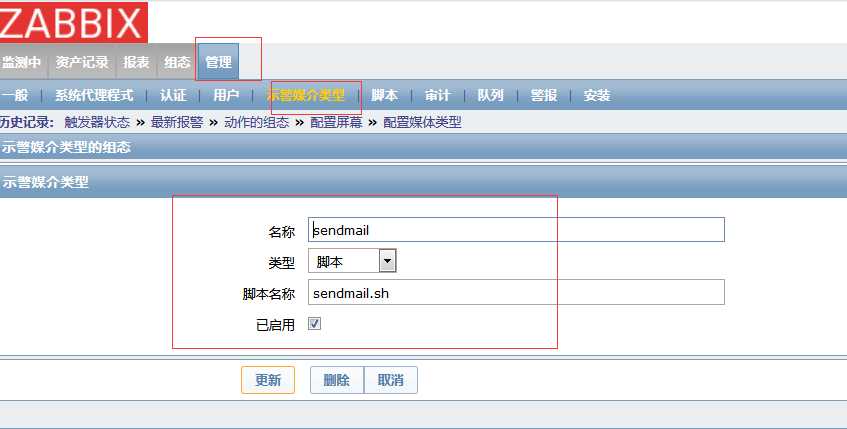
创建动作:Action-mail
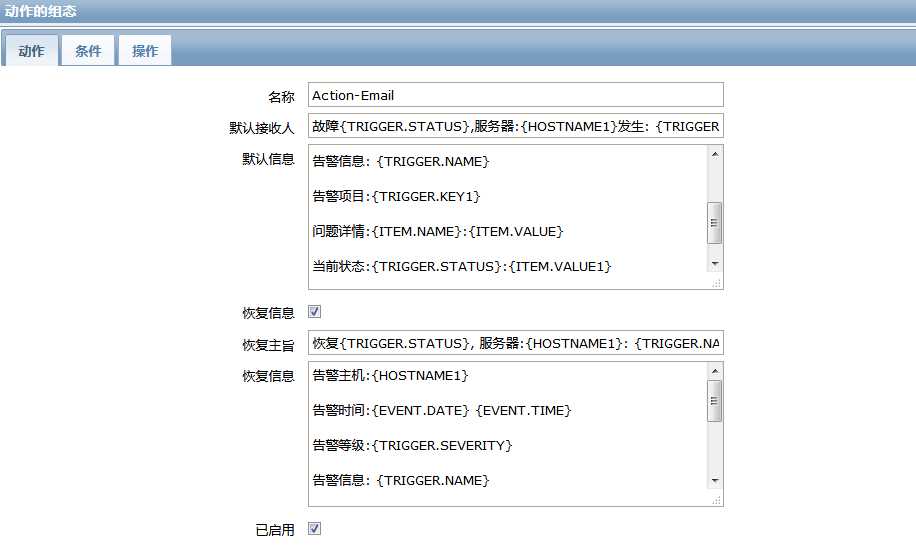
动作内容信息:

Action-Email ############################## 故障{TRIGGER.STATUS},服务器:{HOSTNAME1}发生: {TRIGGER.NAME}故障! ################################ 告警主机:{HOSTNAME1} 告警时间:{EVENT.DATE} {EVENT.TIME} 告警等级:{TRIGGER.SEVERITY} 告警信息: {TRIGGER.NAME} 告警项目:{TRIGGER.KEY1} 问题详情:{ITEM.NAME}:{ITEM.VALUE} 当前状态:{TRIGGER.STATUS}:{ITEM.VALUE1} 事件ID:{EVENT.ID} ###################################### 恢复{TRIGGER.STATUS}, 服务器:{HOSTNAME1}: {TRIGGER.NAME}已恢复! ######################################## 告警主机:{HOSTNAME1} 告警时间:{EVENT.DATE} {EVENT.TIME} 告警等级:{TRIGGER.SEVERITY} 告警信息: {TRIGGER.NAME} 告警项目:{TRIGGER.KEY1} 问题详情:{ITEM.NAME}:{ITEM.VALUE} 当前状态:{TRIGGER.STATUS}:{ITEM.VALUE1} 事件ID:{EVENT.ID}
条件信息:

操作:

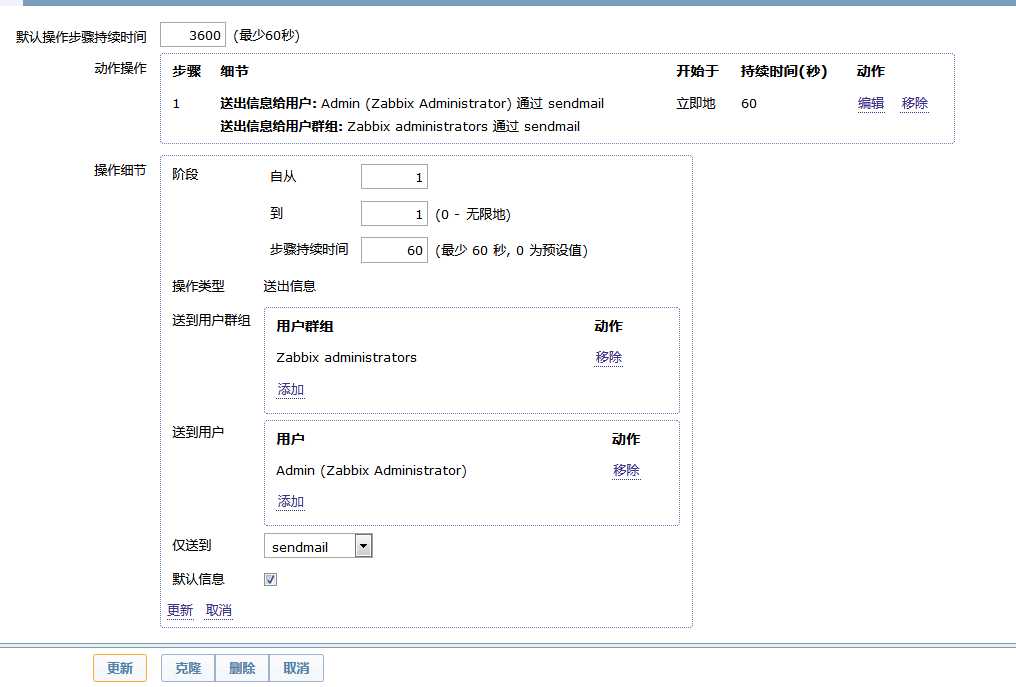
在用户配置下进行调整:

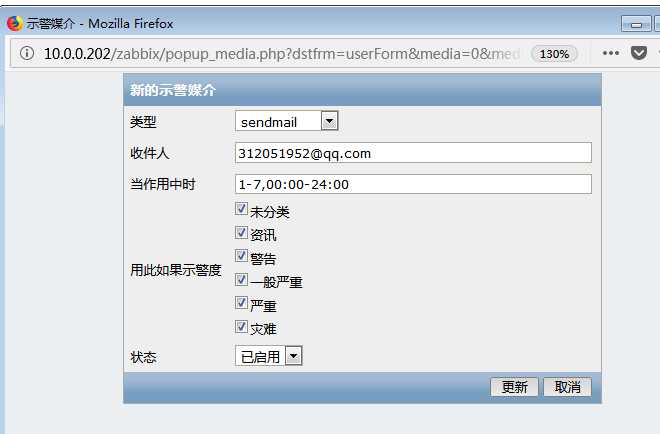
许可权不要动;
######################################################################
agent部署
如果客户端日志当中出现 [root@zabbix-agent-203 ~]# cat /var/log/zabbix/zabbix_agentd.log
active check configuration update from [127.0.0.1:10051] started to fail (cannot connect to [[127.0.0.1]:10051]: [111] Connection refused)
需要对配置文件进行修改:
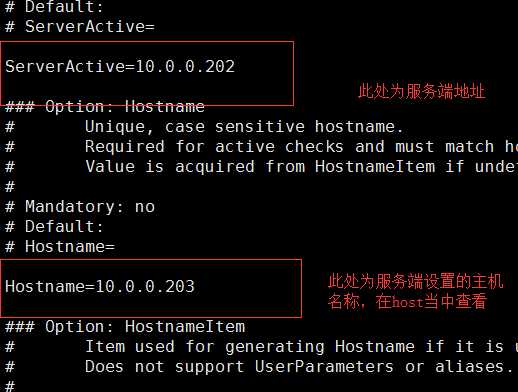
进行修改此处后,重启客户端就不会报错了
客户配置文件附录:

# This is a config file for the Zabbix agent daemon (Unix) # To get more information about Zabbix, visit http://www.zabbix.com ############ GENERAL PARAMETERS ################# ### Option: PidFile # Name of PID file. # # Mandatory: no # Default: # PidFile=/tmp/zabbix_agentd.pid PidFile=/var/run/zabbix/zabbix_agentd.pid ### Option: LogFile # Name of log file. # If not set, syslog is used. # # Mandatory: no # Default: # LogFile= LogFile=/var/log/zabbix/zabbix_agentd.log ### Option: LogFileSize # Maximum size of log file in MB. # 0 - disable automatic log rotation. # # Mandatory: no # Range: 0-1024 # Default: # LogFileSize=1 LogFileSize=0 ### Option: DebugLevel # Specifies debug level # 0 - basic information about starting and stopping of Zabbix processes # 1 - critical information # 2 - error information # 3 - warnings # 4 - for debugging (produces lots of information) # # Mandatory: no # Range: 0-4 # Default: # DebugLevel=3 ### Option: SourceIP # Source IP address for outgoing connections. # # Mandatory: no # Default: # SourceIP= ### Option: EnableRemoteCommands # Whether remote commands from Zabbix server are allowed. # 0 - not allowed # 1 - allowed # # Mandatory: no # Default: # EnableRemoteCommands=0 ### Option: LogRemoteCommands # Enable logging of executed shell commands as warnings. # 0 - disabled # 1 - enabled # # Mandatory: no # Default: # LogRemoteCommands=0 ##### Passive checks related ### Option: Server # List of comma delimited IP addresses (or hostnames) of Zabbix servers. # Incoming connections will be accepted only from the hosts listed here. # If IPv6 support is enabled then ‘127.0.0.1‘, ‘::127.0.0.1‘, ‘::ffff:127.0.0.1‘ are treated equally. # # Mandatory: no # Default: # Server= Server=10.0.0.202 ### Option: ListenPort # Agent will listen on this port for connections from the server. # # Mandatory: no # Range: 1024-32767 # Default: # ListenPort=10050 ### Option: ListenIP # List of comma delimited IP addresses that the agent should listen on. # First IP address is sent to Zabbix server if connecting to it to retrieve list of active checks. # # Mandatory: no # Default: # ListenIP=0.0.0.0 ### Option: StartAgents # Number of pre-forked instances of zabbix_agentd that process passive checks. # If set to 0, disables passive checks and the agent will not listen on any TCP port. # # Mandatory: no # Range: 0-100 # Default: # StartAgents=3 ##### Active checks related ### Option: ServerActive # List of comma delimited IP:port (or hostname:port) pairs of Zabbix servers for active checks. # If port is not specified, default port is used. # IPv6 addresses must be enclosed in square brackets if port for that host is specified. # If port is not specified, square brackets for IPv6 addresses are optional. # If this parameter is not specified, active checks are disabled. # Example: ServerActive=127.0.0.1:20051,zabbix.domain,[::1]:30051,::1,[12fc::1] # # Mandatory: no # Default: # ServerActive= ServerActive=10.0.0.202 ### Option: Hostname # Unique, case sensitive hostname. # Required for active checks and must match hostname as configured on the server. # Value is acquired from HostnameItem if undefined. # # Mandatory: no # Default: # Hostname= Hostname=10.0.0.203 ### Option: HostnameItem # Item used for generating Hostname if it is undefined. Ignored if Hostname is defined. # Does not support UserParameters or aliases. # # Mandatory: no # Default: # HostnameItem=system.hostname ### Option: HostMetadata # Optional parameter that defines host metadata. # Host metadata is used at host auto-registration process. # An agent will issue an error and not start if the value is over limit of 255 characters. # If not defined, value will be acquired from HostMetadataItem. # # Mandatory: no # Range: 0-255 characters # Default: # HostMetadata= ### Option: HostMetadataItem # Optional parameter that defines an item used for getting host metadata. # Host metadata is used at host auto-registration process. # During an auto-registration request an agent will log a warning message if # the value returned by specified item is over limit of 255 characters. # This option is only used when HostMetadata is not defined. # # Mandatory: no # Default: # HostMetadataItem= ### Option: RefreshActiveChecks # How often list of active checks is refreshed, in seconds. # # Mandatory: no # Range: 60-3600 # Default: # RefreshActiveChecks=120 ### Option: BufferSend # Do not keep data longer than N seconds in buffer. # # Mandatory: no # Range: 1-3600 # Default: # BufferSend=5 ### Option: BufferSize # Maximum number of values in a memory buffer. The agent will send # all collected data to Zabbix Server or Proxy if the buffer is full. # # Mandatory: no # Range: 2-65535 # Default: # BufferSize=100 ### Option: MaxLinesPerSecond # Maximum number of new lines the agent will send per second to Zabbix Server # or Proxy processing ‘log‘ and ‘logrt‘ active checks. # The provided value will be overridden by the parameter ‘maxlines‘, # provided in ‘log‘ or ‘logrt‘ item keys. # # Mandatory: no # Range: 1-1000 # Default: # MaxLinesPerSecond=100 ############ ADVANCED PARAMETERS ################# ### Option: Alias # Sets an alias for an item key. It can be used to substitute long and complex item key with a smaller and simpler one. # Multiple Alias parameters may be present. Multiple parameters with the same Alias key are not allowed. # Different Alias keys may reference the same item key. # For example, to retrieve the ID of user ‘zabbix‘: # Alias=zabbix.userid:vfs.file.regexp[/etc/passwd,^zabbix:.:([0-9]+),,,,\1] # Now shorthand key zabbix.userid may be used to retrieve data. # Aliases can be used in HostMetadataItem but not in HostnameItem parameters. # # Mandatory: no # Range: # Default: ### Option: Timeout # Spend no more than Timeout seconds on processing # # Mandatory: no # Range: 1-30 # Default: # Timeout=3 ### Option: AllowRoot # Allow the agent to run as ‘root‘. If disabled and the agent is started by ‘root‘, the agent # will try to switch to the user specified by the User configuration option instead. # Has no effect if started under a regular user. # 0 - do not allow # 1 - allow # # Mandatory: no # Default: # AllowRoot=0 ### Option: User # Drop privileges to a specific, existing user on the system. # Only has effect if run as ‘root‘ and AllowRoot is disabled. # # Mandatory: no # Default: # User=zabbix ### Option: Include # You may include individual files or all files in a directory in the configuration file. # Installing Zabbix will create include directory in /usr/local/etc, unless modified during the compile time. # # Mandatory: no # Default: # Include= Include=/etc/zabbix/zabbix_agentd.d/ # Include=/usr/local/etc/zabbix_agentd.userparams.conf # Include=/usr/local/etc/zabbix_agentd.conf.d/ # Include=/usr/local/etc/zabbix_agentd.conf.d/*.conf ####### USER-DEFINED MONITORED PARAMETERS ####### ### Option: UnsafeUserParameters # Allow all characters to be passed in arguments to user-defined parameters. # 0 - do not allow # 1 - allow # # Mandatory: no # Range: 0-1 # Default: # UnsafeUserParameters=0 ### Option: UserParameter # User-defined parameter to monitor. There can be several user-defined parameters. # Format: UserParameter=<key>,<shell command> # See ‘zabbix_agentd‘ directory for examples. # # Mandatory: no # Default: # UserParameter= ####### LOADABLE MODULES ####### ### Option: LoadModulePath # Full path to location of agent modules. # Default depends on compilation options. # # Mandatory: no # Default: # LoadModulePath=${libdir}/modules ### Option: LoadModule # Module to load at agent startup. Modules are used to extend functionality of the agent. # Format: LoadModule=<module.so> # The modules must be located in directory specified by LoadModulePath. # It is allowed to include multiple LoadModule parameters. # # Mandatory: no # Default: # LoadModule=
服务端配置文件附录:在配置文件当中参数叫DBuser & DBpassword比较关键

# This is a configuration file for Zabbix Server process # To get more information about Zabbix, # visit http://www.zabbix.com ############ GENERAL PARAMETERS ################# ### Option: ListenPort # Listen port for trapper. # # Mandatory: no # Range: 1024-32767 # Default: # ListenPort=10051 ### Option: SourceIP # Source IP address for outgoing connections. # # Mandatory: no # Default: # SourceIP= ### Option: LogFile # Name of log file. # If not set, syslog is used. # # Mandatory: no # Default: # LogFile= LogFile=/var/log/zabbix/zabbix_server.log ### Option: LogFileSize # Maximum size of log file in MB. # 0 - disable automatic log rotation. # # Mandatory: no # Range: 0-1024 # Default: # LogFileSize=1 LogFileSize=0 ### Option: DebugLevel # Specifies debug level # 0 - basic information about starting and stopping of Zabbix processes # 1 - critical information # 2 - error information # 3 - warnings # 4 - for debugging (produces lots of information) # # Mandatory: no # Range: 0-4 # Default: # DebugLevel=3 ### Option: PidFile # Name of PID file. # # Mandatory: no # Default: # PidFile=/tmp/zabbix_server.pid PidFile=/var/run/zabbix/zabbix_server.pid ### Option: DBHost # Database host name. # If set to localhost, socket is used for MySQL. # If set to empty string, socket is used for PostgreSQL. # # Mandatory: no # Default: DBHost=localhost ### Option: DBName # Database name. # For SQLite3 path to database file must be provided. DBUser and DBPassword are ignored. # # Mandatory: yes # Default: # DBName= DBName=zabbix ### Option: DBSchema # Schema name. Used for IBM DB2 and PostgreSQL. # # Mandatory: no # Default: # DBSchema= ### Option: DBUser # Database user. Ignored for SQLite. # # Mandatory: no # Default: # DBUser= DBUser=zabbix ### Option: DBPassword # Database password. Ignored for SQLite. # Comment this line if no password is used. # # Mandatory: no # Default: DBPassword=zabbix ### Option: DBSocket # Path to MySQL socket. # # Mandatory: no # Default: # DBSocket=/tmp/mysql.sock DBSocket=/var/lib/mysql/mysql.sock ### Option: DBPort # Database port when not using local socket. Ignored for SQLite. # # Mandatory: no # Range: 1024-65535 # Default (for MySQL): # DBPort=3306 ############ ADVANCED PARAMETERS ################ ### Option: StartPollers # Number of pre-forked instances of pollers. # # Mandatory: no # Range: 0-1000 # Default: # StartPollers=5 ### Option: StartIPMIPollers # Number of pre-forked instances of IPMI pollers. # # Mandatory: no # Range: 0-1000 # Default: # StartIPMIPollers=0 ### Option: StartPollersUnreachable # Number of pre-forked instances of pollers for unreachable hosts (including IPMI and Java). # At least one poller for unreachable hosts must be running if regular, IPMI or Java pollers # are started. # # Mandatory: no # Range: 0-1000 # Default: # StartPollersUnreachable=1 ### Option: StartTrappers # Number of pre-forked instances of trappers. # Trappers accept incoming connections from Zabbix sender, active agents and active proxies. # At least one trapper process must be running to display server availability and view queue # in the frontend. # # Mandatory: no # Range: 0-1000 # Default: # StartTrappers=5 ### Option: StartPingers # Number of pre-forked instances of ICMP pingers. # # Mandatory: no # Range: 0-1000 # Default: # StartPingers=1 ### Option: StartDiscoverers # Number of pre-forked instances of discoverers. # # Mandatory: no # Range: 0-250 # Default: # StartDiscoverers=1 ### Option: StartHTTPPollers # Number of pre-forked instances of HTTP pollers. # # Mandatory: no # Range: 0-1000 # Default: # StartHTTPPollers=1 ### Option: StartTimers # Number of pre-forked instances of timers. # Timers process time-based trigger functions and maintenance periods. # Only the first timer process handles the maintenance periods. # # Mandatory: no # Range: 1-1000 # Default: # StartTimers=1 ### Option: JavaGateway # IP address (or hostname) of Zabbix Java gateway. # Only required if Java pollers are started. # # Mandatory: no # Default: # JavaGateway= ### Option: JavaGatewayPort # Port that Zabbix Java gateway listens on. # # Mandatory: no # Range: 1024-32767 # Default: # JavaGatewayPort=10052 ### Option: StartJavaPollers # Number of pre-forked instances of Java pollers. # # Mandatory: no # Range: 0-1000 # Default: # StartJavaPollers=0 ### Option: StartVMwareCollectors # Number of pre-forked vmware collector instances. # # Mandatory: no # Range: 0-250 # Default: # StartVMwareCollectors=0 ### Option: VMwareFrequency # How often Zabbix will connect to VMware service to obtain a new data. # # Mandatory: no # Range: 10-86400 # Default: # VMwareFrequency=60 ### Option: VMwarePerfFrequency # How often Zabbix will connect to VMware service to obtain performance data. # # Mandatory: no # Range: 10-86400 # Default: # VMwarePerfFrequency=60 ### Option: VMwareCacheSize # Size of VMware cache, in bytes. # Shared memory size for storing VMware data. # Only used if VMware collectors are started. # # Mandatory: no # Range: 256K-2G # Default: # VMwareCacheSize=8M ### Option: VMwareTimeout # Specifies how many seconds vmware collector waits for response from VMware service. # # Mandatory: no # Range: 1-300 # Default: # VMwareTimeout=10 ### Option: SNMPTrapperFile # Temporary file used for passing data from SNMP trap daemon to the server. # Must be the same as in zabbix_trap_receiver.pl or SNMPTT configuration file. # # Mandatory: no # Default: # SNMPTrapperFile=/tmp/zabbix_traps.tmp SNMPTrapperFile=/var/log/snmptt/snmptt.log ### Option: StartSNMPTrapper # If 1, SNMP trapper process is started. # # Mandatory: no # Range: 0-1 # Default: # StartSNMPTrapper=0 ### Option: ListenIP # List of comma delimited IP addresses that the trapper should listen on. # Trapper will listen on all network interfaces if this parameter is missing. # # Mandatory: no # Default: # ListenIP=0.0.0.0 # ListenIP=127.0.0.1 ### Option: HousekeepingFrequency # How often Zabbix will perform housekeeping procedure (in hours). # Housekeeping is removing outdated information from the database. # To prevent Housekeeper from being overloaded, no more than 4 times HousekeepingFrequency # hours of outdated information are deleted in one housekeeping cycle, for each item. # To lower load on server startup housekeeping is postponed for 30 minutes after server start. # # Mandatory: no # Range: 1-24 # Default: # HousekeepingFrequency=1 ### Option: MaxHousekeeperDelete # The table "housekeeper" contains "tasks" for housekeeping procedure in the format: # [housekeeperid], [tablename], [field], [value]. # No more than ‘MaxHousekeeperDelete‘ rows (corresponding to [tablename], [field], [value]) # will be deleted per one task in one housekeeping cycle. # SQLite3 does not use this parameter, deletes all corresponding rows without a limit. # If set to 0 then no limit is used at all. In this case you must know what you are doing! # # Mandatory: no # Range: 0-1000000 # Default: # MaxHousekeeperDelete=500 ### Option: SenderFrequency # How often Zabbix will try to send unsent alerts (in seconds). # # Mandatory: no # Range: 5-3600 # Default: # SenderFrequency=30 ### Option: CacheSize # Size of configuration cache, in bytes. # Shared memory size for storing host, item and trigger data. # # Mandatory: no # Range: 128K-8G # Default: # CacheSize=8M ### Option: CacheUpdateFrequency # How often Zabbix will perform update of configuration cache, in seconds. # # Mandatory: no # Range: 1-3600 # Default: # CacheUpdateFrequency=60 ### Option: StartDBSyncers # Number of pre-forked instances of DB Syncers # # Mandatory: no # Range: 1-100 # Default: # StartDBSyncers=4 ### Option: HistoryCacheSize # Size of history cache, in bytes. # Shared memory size for storing history data. # # Mandatory: no # Range: 128K-2G # Default: # HistoryCacheSize=8M ### Option: TrendCacheSize # Size of trend cache, in bytes. # Shared memory size for storing trends data. # # Mandatory: no # Range: 128K-2G # Default: # TrendCacheSize=4M ### Option: HistoryTextCacheSize # Size of text history cache, in bytes. # Shared memory size for storing character, text or log history data. # # Mandatory: no # Range: 128K-2G # Default: # HistoryTextCacheSize=16M ### Option: ValueCacheSize # Size of history value cache, in bytes. # Shared memory size for caching item history data requests. # Setting to 0 disables value cache. # # Mandatory: no # Range: 0,128K-64G # Default: # ValueCacheSize=8M ### Option: Timeout # Specifies how long we wait for agent, SNMP device or external check (in seconds). # # Mandatory: no # Range: 1-30 # Default: # Timeout=3 ### Option: TrapperTimeout # Specifies how many seconds trapper may spend processing new data. # # Mandatory: no # Range: 1-300 # Default: # TrapperTimeout=300 ### Option: UnreachablePeriod # After how many seconds of unreachability treat a host as unavailable. # # Mandatory: no # Range: 1-3600 # Default: # UnreachablePeriod=45 ### Option: UnavailableDelay # How often host is checked for availability during the unavailability period, in seconds. # # Mandatory: no # Range: 1-3600 # Default: # UnavailableDelay=60 ### Option: UnreachableDelay # How often host is checked for availability during the unreachability period, in seconds. # # Mandatory: no # Range: 1-3600 # Default: # UnreachableDelay=15 ### Option: AlertScriptsPath # Full path to location of custom alert scripts. # Default depends on compilation options. # # Mandatory: no # Default: # AlertScriptsPath=${datadir}/zabbix/alertscripts AlertScriptsPath=/usr/lib/zabbix/alertscripts ### Option: ExternalScripts # Full path to location of external scripts. # Default depends on compilation options. # # Mandatory: no # Default: # ExternalScripts=${datadir}/zabbix/externalscripts ExternalScripts=/usr/lib/zabbix/externalscripts ### Option: FpingLocation # Location of fping. # Make sure that fping binary has root ownership and SUID flag set. # # Mandatory: no # Default: # FpingLocation=/usr/sbin/fping ### Option: Fping6Location # Location of fping6. # Make sure that fping6 binary has root ownership and SUID flag set. # Make empty if your fping utility is capable to process IPv6 addresses. # # Mandatory: no # Default: # Fping6Location=/usr/sbin/fping6 ### Option: SSHKeyLocation # Location of public and private keys for SSH checks and actions. # # Mandatory: no # Default: # SSHKeyLocation= ### Option: LogSlowQueries # How long a database query may take before being logged (in milliseconds). # Only works if DebugLevel set to 3 or 4. # 0 - don‘t log slow queries. # # Mandatory: no # Range: 1-3600000 # Default: # LogSlowQueries=0 ### Option: TmpDir # Temporary directory. # # Mandatory: no # Default: # TmpDir=/tmp ### Option: StartProxyPollers # Number of pre-forked instances of pollers for passive proxies. # # Mandatory: no # Range: 0-250 # Default: # StartProxyPollers=1 ### Option: ProxyConfigFrequency # How often Zabbix Server sends configuration data to a Zabbix Proxy in seconds. # This parameter is used only for proxies in the passive mode. # # Mandatory: no # Range: 1-3600*24*7 # Default: # ProxyConfigFrequency=3600 ### Option: ProxyDataFrequency # How often Zabbix Server requests history data from a Zabbix Proxy in seconds. # This parameter is used only for proxies in the passive mode. # # Mandatory: no # Range: 1-3600 # Default: # ProxyDataFrequency=1 ### Option: AllowRoot # Allow the server to run as ‘root‘. If disabled and the server is started by ‘root‘, the server # will try to switch to the user specified by the User configuration option instead. # Has no effect if started under a regular user. # 0 - do not allow # 1 - allow # # Mandatory: no # Default: # AllowRoot=0 ### Option: User # Drop privileges to a specific, existing user on the system. # Only has effect if run as ‘root‘ and AllowRoot is disabled. # # Mandatory: no # Default: # User=zabbix ### Option: Include # You may include individual files or all files in a directory in the configuration file. # Installing Zabbix will create include directory in /usr/local/etc, unless modified during the compile time. # # Mandatory: no # Default: # Include= # Include=/usr/local/etc/zabbix_server.general.conf # Include=/usr/local/etc/zabbix_server.conf.d/ # Include=/usr/local/etc/zabbix_server.conf.d/*.conf ### Option: SSLCertLocation # Location of SSL client certificates. # This parameter is used only in web monitoring. # # Mandatory: no # Default: # SSLCertLocation=${datadir}/zabbix/ssl/certs ### Option: SSLKeyLocation # Location of private keys for SSL client certificates. # This parameter is used only in web monitoring. # # Mandatory: no # Default: # SSLKeyLocation=${datadir}/zabbix/ssl/keys ### Option: SSLCALocation # Override the location of certificate authority (CA) files for SSL server certificate verification. # If not set, system-wide directory will be used. # This parameter is used only in web monitoring. # # Mandatory: no # Default: # SSLCALocation= ####### LOADABLE MODULES ####### ### Option: LoadModulePath # Full path to location of server modules. # Default depends on compilation options. # # Mandatory: no # Default: # LoadModulePath=${libdir}/modules ### Option: LoadModule # Module to load at server startup. Modules are used to extend functionality of the server. # Format: LoadModule=<module.so> # The modules must be located in directory specified by LoadModulePath. # It is allowed to include multiple LoadModule parameters. # # Mandatory: no # Default: # LoadModule=
至此修改完全结束;将客户端服务停掉。测试看看能否收到邮件
[root@zabbix-agent-203 ~]# /etc/init.d/zabbix-agent stop
收到该邮件则表明zabbix监控部署测试OK

再把服务恢复[root@zabbix-agent-203 ~]# /etc/init.d/zabbix-agent start
看看能否收到邮件

#################################################至此zabbix部署完毕 可能还有一些需要调整的地方 未完待续##############################
补充说明一点。如果5分钟后zabbix-agent还没有起来的话,不会再次重发邮件的;这一点请注意;
标签:rect 配置 end close tomat postgre inux etc ignore
原文地址:https://www.cnblogs.com/nodchen/p/9206265.html